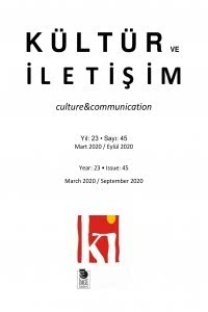Nietzsche'nin Natüralizmi Karşısında Hegel'in Diyalektiği
Bu makale, Nietzsche'deki efendi/köle ahlaki kimlik oluşumunun Hegel'deki efendi/köle kimlik oluşumuyla karşılaştırılmasını içermektedir. Yazıda Nietzsche natüralist olarak yorumlanmıştır ve bu haliyle Hegelci anlayışın karşısına yerleştirilmiştir. Yazının amacı Hegelin diyalektik efendi/köle kavrayışının Nietzsche'nin natüralist kavrayışına olan üstünlüŞünü göstermektir. Elbette tek Nietzsche yorumu natüralist yorum deŞildir, post-modern yorumlar da vardır; fakat burada onun bir natüralist yorumu izlenmektedir ve bu suretle de referans alınmış olan temel yazar Brian Leiter'dır. Nietzsche natüralist yaklaşımıyla efendi ve köle kimliklerini özsel bir şeymiş gibi ele almış ve onların deŞişmezliŞini vurgulamıştır. Tersine Hegel, diyalektik kavrayışıyla hem efendi hem köle kimliklerini tarihsel ve sosyal bir baŞlama oturtmuş, onların oluşumunu ve devamını kişilerarası bir çerçeveye yerleştirmiştir. Dolayısıyla, yazıda savunulan şudur: Özcü yaklaşımıyla Nietzsche bir metafizikçi olarak kalmış, Hegel ise diyalektik metoduyla bunu aşabilmiştir.
Hegel's Dialectics versus Nietzsche's Naturalism
This article is a comparison between the construction of Nietzschean master/slave moral identity with the Hegelian one. In the study Nietzsche is interpreted as a naturalist and therefore put against the Hegelian understanding. The aim of the article is to show the superiority of Hegelian dialectical conception of master/slave to the Nietzschean naturalist one. Naturalist interpretation of Nietzsche's philosophy is of course not the only one. There are post-modern interpretations as well, but here I followed a naturalist interpretation and took Brian Leiter as my referential guide. Nietzsche, with his naturalist approach, takes the master and slave moral identities as something essential and thereby emphasizes their unchangeable character. On the contrary, Hegel, with his dialectic understanding, puts both master and slave identities into a historical and social context and places the formation and continuation of the master and slave identities within an interpersonal framework. Therefore, Nietzsche, with his essentialist approach, remains as a metaphysician and only Hegel can overcome it with a dialectical method
___
- Hegel, Georg W. F. (1996). Early Theological Writings. Çev., T. M. Knox. Philadelphia: University of Pennsylvania.
- Hegel, Georg W. F. (1977). Phenomenology of Spirit. Çev., A. V. Miller. Oxford: Oxford University.
- Hegel, Georg W. F. (1967). Hegel's Philosophy of Right. Çev., T. M. Knox. London: Oxford University.
- Nietzsche, Friedrich (1999). The Birth of Tragedy and the Other Writings. Der., Raymond Geuss ve Ronald Speirs. Çev., Ronald Speirs. Cambridge: Cambridge University Press.
- Nietzsche, Friedrich (1998). Beyond Good and Evil. Çev., Marion Faber. Oxford: Oxford University.
- Nietzsche, Friedrich (1997). Twilight of the Idols. Çev., Richard Polt. Cambridge: Hackett.
- Nietzsche, Friedrich (1996). On the Genealogy of Morals. Çev., Douglas Smith. Oxford: Oxford University.
- Nietzsche, Friedrich (1985). Twilight of the Idols/The Anti-Christ. Çev., R. J. Hollingdale. Harmondsworth: Penguin.
- Nietzsche, Friedrich (1974). The Gay Science. Çev., Walter Kaufmann. New York: Vintage.
- Nietzsche, Friedrich (1968).The Will to Power. Çev., Walter Kaufmann ve R. J. Hollingdale. New York: Vintage Books.
- Ansell-Pearson, Keith (1994). An Introduction to Nietzsche as Political Thinker: The Perfect Nihilist. Cambridge: Cambridge University.
- Berkowitz, Peter (1996). Nietzsche: The Ethics of an Immoralist. Cambridge: Harvard University.
- Clarck, Maudemarie (1991). Nietzsche on Truth and Philosophy. Cambridge: Cambridge University Press.
- Clarck, Maudemarie (2004). "Nietzsche's Post-Positivism."European Journal of Philosophy.12 (3): 369-385.
- Conway, Daniel W. (1997a). Nietzsche & the Political. London: Routledge.
- Conway, Daniel W. (1997b). Nietzsche's Dangerous Game: Philosophy in the Twilight of the Idols. Cambridge: Cambridge University.
- Copleston, Frederick (2003). A History of Philosophy: Greece and Rome Vol. 1. London: Continuum.
- Dudley, Will (2002). Hegel, Nietzsche, and Philosophy. Cambridge: Cambridge University.
- Harris, H. S. (1972). Hegel's Development: Towards the Sunlight 1770-1801. Oxford: Oxford University.
- Hawkes, David (1996). Ideology. London: Routledge.
- Houlgate, Stephen (1986). Hegel, Nietzsche and the Criticism of Metaphysics. Cambridge: Cambridge University.
- Houlgate, Stephen (1991). Freedom, Truth and History.London: Routledge.
- Hinchman, Lewis P. (1984). Hegel's Critique of the Enlightenment. Tampa, Gainesville, Florida: University Presses of Florida.
- Leiter, Brian (2002). Nietzsche on Morality. London: Routledge.
- Marx, Karl (1999). Capital: A New Abridgement. Oxford: Oxford University Press.
- Nehamas, Alexander (1985). Nietzsche: Life as Literature. Cambridge: Harvard University.
- Otto, Rudolf (1958). The Idea of the Holy. Çev., John W. Harvey. London: Oxford University.
- Paquet, Marcel (2000). René Magritte 1898-1967: Thought Rendered Visible. Köln: Benedikt Taschen.
- Pippin, Robert B (1991). Modernism as a Philosophical Problem. Cambridge: Blackwell.
- Richardson, John (1996). Nietzsche's System. Oxford: Oxford University.
- Rorty, Richard (1991). Objectivity, Relativism, and Truth: Philosophical Papers, Vol. I. Cambridge: Cambridge University Press.
- Stace, W. T. (1955). The Philosophy of Hegel. London: Dover.
- Stern, Robert (2002). Hegel and the Phenomenology of Spirit. London: Routledge.
- Thiele, Leslie Paul (1990). Frederich Nietzsche and the Politics of the Soul: A Study of Heroic Individualism. Princeton: Princeton University.
- Welshon, Rex (2004). The Philosophy of Nietzsche.Chesman: Acumen.
- Yerkes, James (1983). Christology of Hegel. Albany: SUNY.
- Zizek, Slovaj (1993). Tarrying with the Negative: Kant, Hegel, and the Critique of Ideology. Durham: Duke University.
- ISSN: 1301-7241
- Yayın Aralığı: Yılda 2 Sayı
- Başlangıç: 1998
- Yayıncı: İmge Kitabevi Yayınları
Sayıdaki Diğer Makaleler
Gençlik Halleri: 2000'li Yıllar Türkiye'sinde Genç Olmak
"Kalkınan" Taşra: Gaziantep Yerel Basınında Kalkınma Söylemi
Hareket ve Anlatı: Film Zamanı şçin Çift Yönlü bir Analiz Denemesi
Stuart Hall'un Düşüncesinde Belirlenim ve Marksizm
Gösterileşen Oehir, ÇaŞıran Yaşam Tarzları ve Gizlenen Sınıfsal Farklılık
